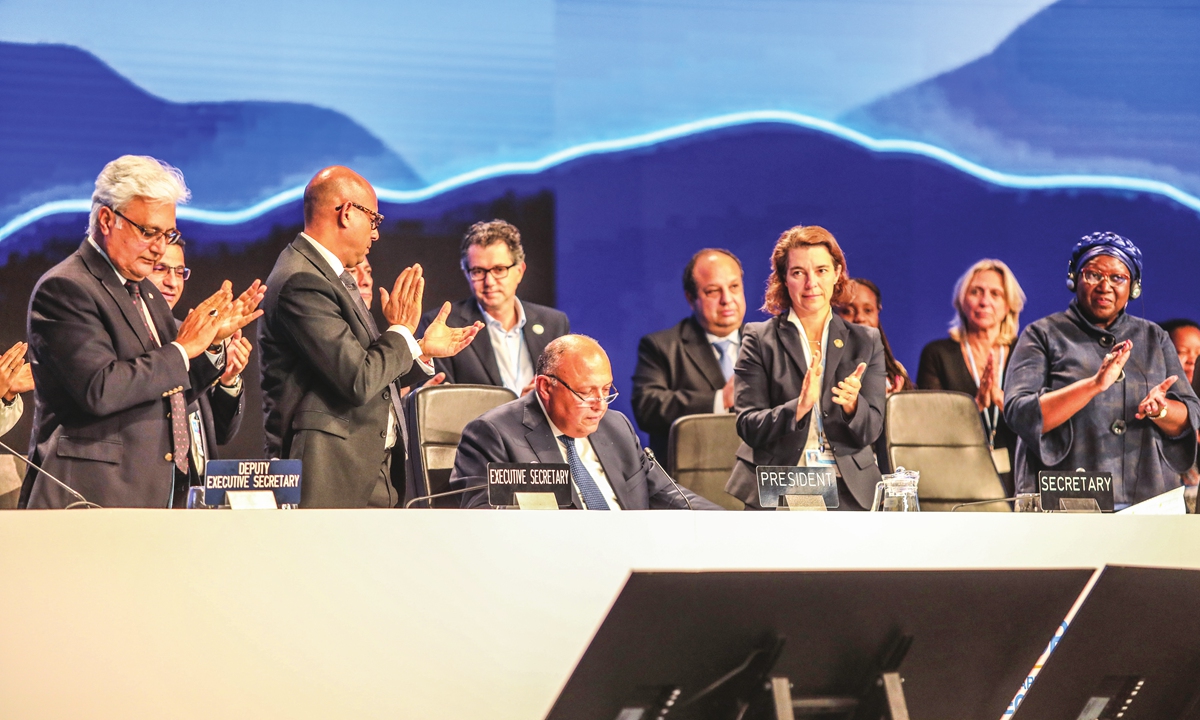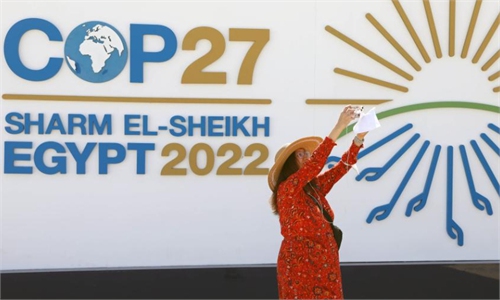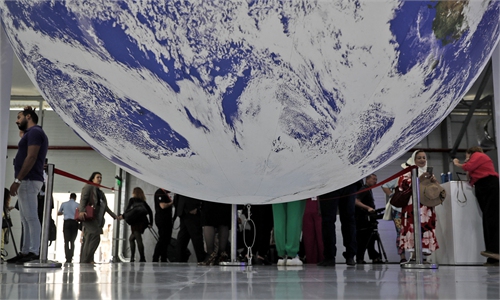COP27 concludes on Sunday, yields ‘historic’ deal on climate loss and damage
Western countries under test again, as doubts amounting if they can honor promise this time

A logo of the COP 27 summit.Photo: Xinhua

COP27 President and Egyptian Foreign Minister Sameh Shoukry (center) speaks during the closing session of UN climate summit COP27 held in Sharm El-Sheikh, Egypt on November 20, 2022. Photo: VCG
In what has been hailed as a "breakthrough" achievement, negotiators from nearly 200 countries agreed to set up a "loss and damage" fund meant to help vulnerable countries cope with climate disasters after two weeks of negotiations at COP27 in Sharm El-Sheikh, Egypt. Experts said that although the landmark agreement will serve as a powerful response to developing countries' requests, it will only come into effect as long as rich countries honor their promises, rather than making another sham promise just to quell poorer countries' criticism.China, a strong supporter of establishing a loss and damage mechanism, has been actively helping developing countries tackle climate issues via the South-South cooperation. But faced with pressure from the US and other countries for China to contribute to the loss and damage mechanism, experts said that the onus is first and foremost on rich countries, the main contributors to historical global warming, to pay for the mechanism, and that China will not be coerced or pressured on climate issues.
After days of intense negotiations that stretched into early Sunday morning in Sharm El-Sheikh, countries at the COP27 reached agreement on an outcome that established a funding mechanism to compensate vulnerable nations for loss and damage from climate-induced disasters.
The deal calls for a committee with representatives from 24 countries to work over the next year to figure out exactly what form the fund should take, which countries should contribute and where the money should go. Many details, however, remain vague, media reported.
"This COP has taken an important step towards justice. I welcome the decision to establish a loss and damage fund and to operationalize it in the coming period," UN Secretary-General António Guterres said in a video message issued from the conference venue in Egypt, underscoring that the voices of those on frontlines of the climate crisis must be heard.
"The announcement offers hope to vulnerable communities all over the world who are fighting for their survival from climate stress," said Sherry Rehman, Pakistan's minister for climate change. The agenda item was proposed by Pakistan on behalf of the Group of 77 coalitions of developing nations and China during talks in Bonn, Germany, earlier this year.
Chinese scientists praised the deal as "historic." Under the backdrop of the ever more intense climate crisis, this agreement serves as a powerful response, and a political signal to developing nations' requests on the climate crisis, which can help alleviate the global damage from the crisis," Li Shuo, a senior global policy adviser at Greenpeace China who is attending the summit, told the Global Times.
The creation of a loss and damage fund was almost derailed by disputes that ran into the dawn hours of Sunday over other elements of a broader agreement, including how deeply countries should cut their emissions and whether to include language that explicitly called for a phase out of fossil fuels, including coal, natural gas and oil. By 5 am in Egypt, negotiators were still debating those other measures, media reported.
The US and other wealthy countries had long blocked the idea, for fear that they could be held legally liable for historical greenhouse gas emissions and the colossal payment they could face.
Although agreement on the mechanism was reached, Yang Fuqiang, a research fellow at Peking University's Research Institute for Energy is pessimistic that the promise will translate into meaningful action by the rich countries.
"Developed countries are constantly grilled on why they have defaulted on their previous promises of transferring $100 billion per year to vulnerable states hit by increasingly severe climate-linked impacts and asked to be responsible for their historical emissions. So maybe signing this agreement is just to quell developing countries from firing criticisms at them," Yang told the Global Times.
"It is almost predictable that US and other rich countries are just making empty promises," Yang said.
A decade ago, the US, European Union and other wealthy emitters pledged to mobilize $100 billion per year in climate finance by 2020 to help poorer countries shift to clean energy and adapt to future climate risks through measures like building sea walls. They are still falling short by tens of billions of dollars annually.
Yang pointed out that details of how to carry out the mechanism are not hammered down, nor is how to quantify the damage caused by climate crisis, which will make it difficult for the mechanism to work and leaves room for rich countries to maneuver.
"Moving forward into discussions [on] the details of the [loss and damage] fund, we need to ensure that the countries and corporations most responsible for the climate crisis make the biggest contribution. That means new and additional finance for developing countries and climate vulnerable communities not just for loss and damage, but for adaptation and mitigation too," Yeb Sa?o, Executive Director, Greenpeace Southeast Asia and Head of the Greenpeace delegation attending the COP said in a statement sent to the Global Times on Sunday.
But the US and the European Union are pushing for assurances that China will eventually contribute to the fund - and that China would not be eligible to receive money from it, The New York Times reported on Sunday.
When asked whether the US has informed him that China should contribute to the loss and damage fund, Xie Zhenhua, China's special envoy on climate change said that China supports the loss and damage mechanism. He said the solution is simple, that is common but differentiated responsibility.
"China has no responsibility [on loss and damage], but China is willing to help developing countries raise their adaptability by South-South cooperation and China is already doing that," Xie said.
China is still a developing country and it has been offering help to developing countries via multiple international channels, said Yang. "We stick to common but differentiated responsibility, and we will never be coerced or pressured by Western countries on climate issues."
A constructive negotiation
On Saturday local time, Xie told reporters that Chinese and US negotiators had "very candid, friendly, positive and constructive" negotiation at COP27, and the result is very constructive, but will only be made public after formal negotiations.
Xie said that formal talks, or even face-to-face discussion between Beijing and Washington, will be conducted after COP27 is concluded.
The fact that Xie's US counterpart John Kerry tested positive for COVID-19 has hampered the two countries' discussions at the summit.
Climate negotiations between the two countries resumed after the meeting between Chinese President Xi Jinping and US President Joe Biden on the sidelines of the G20 summit last week in Bali, Indonesia. The two presidents agreed that the two countries will jointly work for the success of COP27.
Scientists are overwhelmingly praising the resumption of talks between the world's two biggest economies as a positive sign, and the final negotiations could yield positive results to help reduce greenhouse gas emissions.
"The US is denounced by other Western countries as it lacks efficient efforts in tackling global warming, and flip flops on its climate promises. Thus it strives to cooperate with China, because Beijing wins wide support among developing countries on addressing climate change," Yang said.
However, to show sincerity over the cooperation, Washington must abandon its previous crackdown on China's clean energy industry, such as on photovoltaic products, Yang warned.




